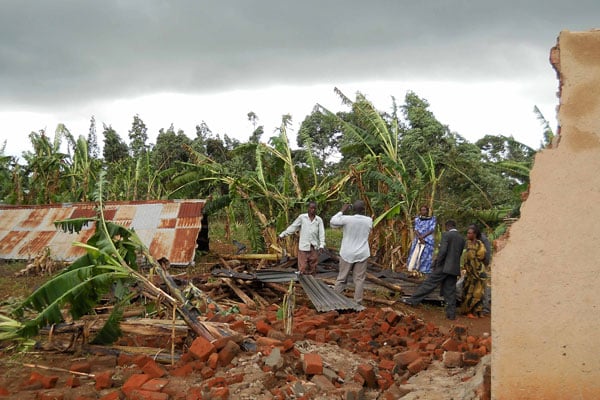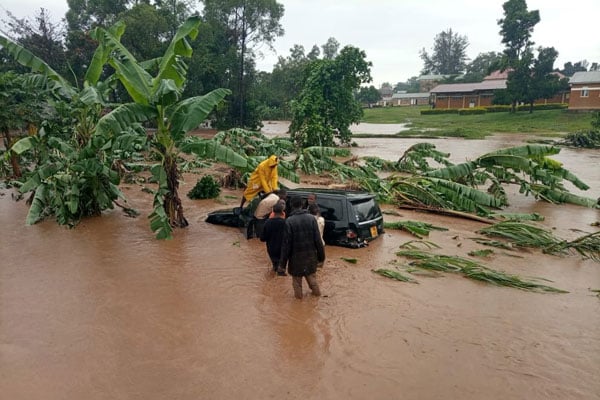Prime
Floods: Agricultural insurance an innovation to compensate farmers

A building and banana plantation destroyed by heavy rainstorm last week in Masaka District. Photo/Michael J Ssali
What you need to know:
- A heavy rainstorm can fell to the ground the banana trees in an entire banana plantation and cause untold damage.
- Many times buildings are also destroyed depriving the farmer of safe accommodation and safe storage of his farm products.
The country has been experiencing a lot of rainstorm calamities in the recent weeks including flooding, and destruction of buildings, roads, and crops.
Yet last year many parts of the country did not receive sufficient rainfall which resulted in general poor livestock and crop production.
Risks and uncertainties
Like other businesses farming is shrouded in risks and uncertainties. It is a business that is mostly carried out in the open, under the sun, where wind, rain, thieves, insects, and the birds of the air have easy access to it.
The farmer often worries about the possibility of extreme weather conditions that may destroy his crops or the grass on which farmed animals feed.
Extreme drought conditions result in shortage of fodder grass and manufactured animal feeds.
The farmer then worries about the resultant high prices for not only inputs in terms of feeds and low profits but also the likely reduced demand for the crops, milk, eggs, and meat since impoverished people have little inclination to spend.

Crop destruction
Random weather changes often cause destruction to crops, animals and buildings. Pests and diseases can attack and destroy crops and animals.
A heavy rainstorm can fell to the ground the banana trees in an entire banana plantation and cause untold damage.
Many times buildings are also destroyed depriving the farmer of safe accommodation and safe storage of his farm products. Thieves can steal crops, livestock, and farm machinery.
Yet the farmer’s earnings are expected to come from the sale of crops and livestock, or livestock products such as milk and eggs.
The machines are used to do work on the farm and they are a means of production. Work stalls when the machines are stolen or when they are damaged. A fire outbreak can cause real destruction to buildings and farm machinery which may be a major drawback to the farmer’s work.
Another common risk is when a farmer grows a crop such as maize expecting to sell it at a reasonably high price and to make some profit only to discover that many other farmers have grown the crop and the prices are too low. Only very few farmers can store the harvested maize and wait for the prices to improve.
Planning early
Big farmers such as former finance minister, Gerald Ssendaula, have well-constructed buildings (granaries) on their farms for the purpose of storing harvested crops until the prices of the commodities improve.
There are buildings on the farms for storing tools, seeds, pesticides, and other inputs. “One way for the farmer to avoid selling a commodity at unacceptable prices to the farmer is for him to have the capacity to store it until the prices improve,” he says.
So when gale or a fire outbreak destroys buildings on the farm including the granary the farmer loses storage space and the capacity to wait for the prices of his farm products to improve.
Flooding causes losses of crops
Flooding and landslides cause sudden losses of crops in the fields, livestock and buildings.
Farmers’ incomes are derived from the sale of farm products and any massive destruction of property such as buildings, machinery, and investments can be a major drawback. Other unexpected hazards that farmers face are workers’ strikes and abandonment of work at the farm due to low pay and other reasons.
Poor health of the farmer or his dear ones can cause difficulties in attaining expected yields. Money supposed to buy the required farm inputs and the time that should be spent on the farm is wasted in hospital visits and medical expenses.
Farmers must insure their crops
Deus Nuwagaba, Assistant Executive Director of National Union of Coffee Agribusinesses and Farm Enterprises, (NUCAFE) has told Seeds of Gold, “We do not want our farmers to make losses due to unforeseen problems that crop up in their farms. NUCAFE in partnership with other partners such as the Agricultural Insurance Consortium is sensitising farmers about the need for taking up agricultural insurance. Farming has a lot of risks. Agricultural insurance is a new innovation that is aimed at compensating farmers for losses arising from unplanned and unexpected misfortunes.”
Keeping records
He explained that to benefit from the innovation, all farmers should keep accurate records of income and expenditures and be in a position to provide a good estimate of their losses.
Many insurance companies will want a good record of the farm’s performance in the past few years before registering a farmer for coverage. Nuwagaba says that when a farmer takes an insurance policy the government contributes a certain amount towards the premium.
“Insurance is like a shock absorber and it is intended to guard smallholder farmers against the ravages of climate change such as drought and heavy rainstorms,” says Nuwagaba.
Where to seek agriculture insurance
It is now up to the farmers to approach organisations such as NUCAFE to seek guidance about the benefits of agricultural insurance and to consult different insurance companies to see which ones are willing to offer them protection and their requirements. Some insurance companies can cover physical loss or damage to growing crops directly caused by hazards such as drought, hailstone damage, malicious damage, uncontrolled pests and diseases, earthquakes, flooding of the crop field, riots and strikes, explosions, windstorms and fire. Some insurance companies can extend coverage to harvested yield being stored at the farm or any other place and when the commodity is in transit.
Fence your garden
Mr Charles Katabalwa, Managing Director of SAWA Agricultural Development Company Limited, Mpigi, advises farmers to put live fences around their gardens. He explained that a live fence is a fence of living trees which can act as wind breakers to mitigate gale.
He also advises farmers to practice what he calls agro-forestry. He further tells farmers to be conscious that we are now operating under climate change conditions and to keep the soil well covered with grass or leaves to prevent soil erosion by running water.
“Destruction of crops by flooding can also be prevented by avoiding growing crops too close to wetlands,” says Katabalwa.
“The water volumes in the rivers and other water bodies swell and take over land ordinarily known to be good for agriculture. Growing crops in such places as Lwera along the Kampala-Masaka Highway disturbs the ecosystem and prevents the natural flow of water, resulting in floods.”

Environment protection
Katabalwa is of the view that all village leaders should be sensitised about environment protection. “We should have village environment protection committees everywhere to ensure that any encroachment on wetlands and natural forests is nabbed in the bud. But to merely depend on District Environment Officers for protecting the forests and swamps is futile since they are all often too far away from where most of the destruction is taking place.”
For farmers who grow crops on the hills, Katabalwa has some advice to prevent running water from carrying away the crops. “They should plant grass bands across the garden to mitigate soil erosion and washing away of crops,” he says.
Insurance
The Agro Consortium currently consists of Thirteen (13) Insurance Companies offering Agriculture insurance covering crop and livestock risks. The participating insurers are APA Insurance Co Ltd, GA Insurance, Sanlam General Insurance Co. Ltd, MUA Insurance Co. Ltd, Jubilee Insurance, UAP Old Mutual Insurance, CIC General Insurance, First Insurance Company, NIC General Insurance Co. Ltd, Pax Insurance, Alliance Africa Insurance Co. Ltd, Excel Insurance Limited and Mayfair Insurance (U) Limited
Crop loss
Flooding and landslides cause sudden losses of crops in the fields, livestock and buildings. Farmers’ incomes are derived from the sale of farm products and any massive destruction of property such as buildings, machinery, and investments can be a major drawback.
Advice
Mr Charles Katabalwa, Managing Director of SAWA Agricultural Development Company Limited, Mpigi, advises farmers to put live fences around their gardens. He explained that a live fence is a fence of living trees which can act as wind breakers to mitigate gale. He also advises farmers to practice what he calls agro-forestry.




